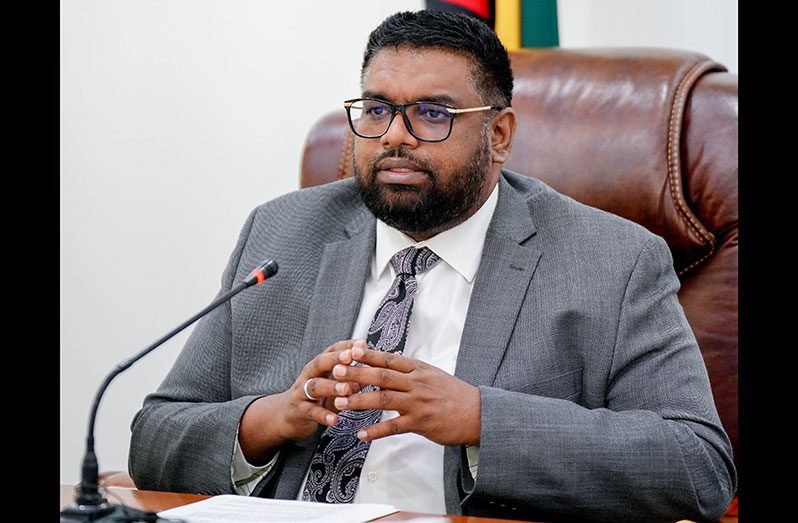…as Guyana prepares for ‘tsunami of opportunities’
THE Government of Guyana is currently working to develop a National Trade Policy which seeks to boost competitiveness of local businesses, while dismantling barriers that complicate the trade and investment processes in Guyana.
This announcement was made by President, Dr. Irfaan Ali, on Tuesday, during his keynote address to the 131st Annual General Meeting (AGM) of the Georgetown Chamber of Commerce and Industry (GCCI). Dr. Ali told the virtual meeting that all efforts are being made at the level of the government to alleviate the hassle of doing business in Guyana. “Bottlenecks, red tape with its tedious, multi-layered official procedures and administrative gridlock, all carry additional costs for businesses and harm their competitiveness,” Dr. Ali acknowledged, as he pointed to the planned implementation of an Electronic Single Window for Trade, which is similarly aimed at reducing the time and costs of doing business in Guyana.
“I have also discussed with the Mayor of Georgetown the development of a similar system for the processing of building permits and plans,” the President said.
He also pointed to the National Quality Infrastructure (NQI) project, which aims to improve the quality of local products and services, thereby stimulating demand, and positioning local entities to engage in regional and global trade. The Head-of-State cautioned that even with the many initiatives being implemented by the government, the growth of Guyana’s commercial community requires innovation and co-operation at all levels. “Economic transformation demands a new mindset. The private sector must begin to think bigger, bolder, braver and brainier. In other words, it must become more ambitious, less risk-averse and more innovative,” Dr. Ali said, as he called on the business community to prepare for the “tsunami of opportunities” that lies ahead. The President also commended the business community for maintaining high levels of resilience, and being able to adapt and push past the many barriers that sought to stifle their growth, prior to the change of government in 1992.
“Ingenious ways were found to source goods, including spares. Small-scale trading allowed for the survival of commerce, and when the situation changed for the better, the business community positioned itself to make the most of the improving economic climate. Adaptation to change has indeed been the forte of the local business class,” Dr. Ali said. He noted, however, that while the government will support the growth of the business community, it will not be taking up a babysitter-like role.
“Government will work to set the framework for fair competition, but it will not deploy overtly protectionist measures to shield the private sector from competition,” Dr. Ali said, adding: “I know that 2020 was a difficult year, but I assure you that the worst of its economic effects are over. This is the time of recovery, rebounding, and a booming economy.” He also made specific references to the importance of small businesses, which he says are vital and indispensable in the process of economic development.
“Small businesses represent the arms and legs, propelling our economy forward, sustaining employment and acting as vital cogs in the distribution, marketing and consumption of goods and services of large businesses,” President Ali reasoned. To this end, he said that the government’s commitment to the development of small businesses can be seen in the passage of the Small Business (Amendment) Bill 2020, which expands the range of procurement opportunities for small businesses.
“We have already granted small businesses a five per cent advantage in bidding for state contracts. Also, the maximum threshold for grants disbursed by the Small Business Bureau through the Small Business Development Fund has been increased by 100 per cent,” Dr. Ali said. He added, “We have committed to working with stakeholders to improve small businesses access to finance. In addition, our plans for small business development include the development of business incubators nationwide.”
The President also underscored the importance of good relations among local businesses, even as they gear up to compete with each other.
“Local content is action, not only by government to ensure more opportunities are given to local businesses, but by local businesses encouraging and supporting each other wherever opportunities are,” Dr. Ali said, noting: “That is the only way Guyana will win. That is the only way we can build through local content; when the private sector becomes a supportive mechanism for each other.” The President also called for better relations between private sector agencies and the media.
“We cannot destroy each other with suspicion, where questions are necessary, the questions should be asked, and the answers should be provided,” Dr. Ali posited.
He recognised too that a growing economy is likely to attract criminal activities which can be crippling to businesses.
As a response, the President said that the administration will be pursuing a robust anti-crime strategy to better protect businesses, communities and citizens.




.png)









